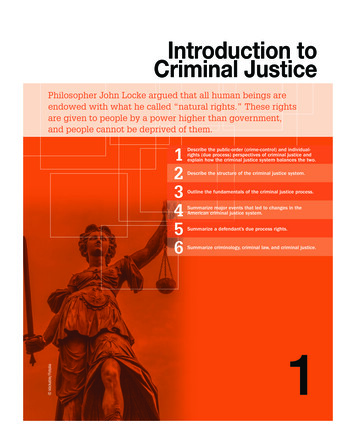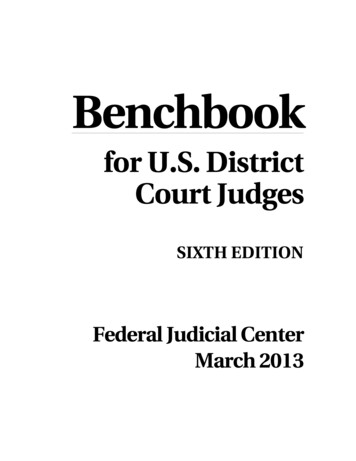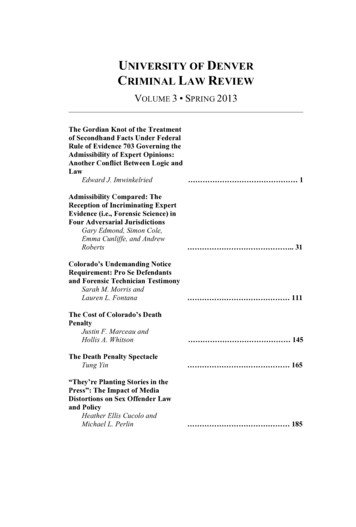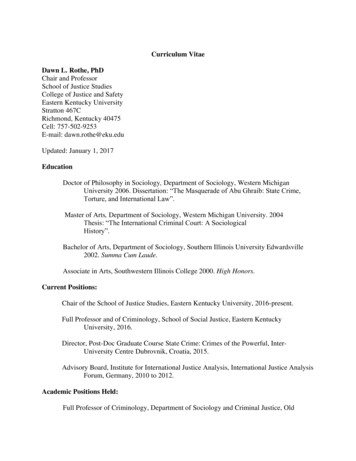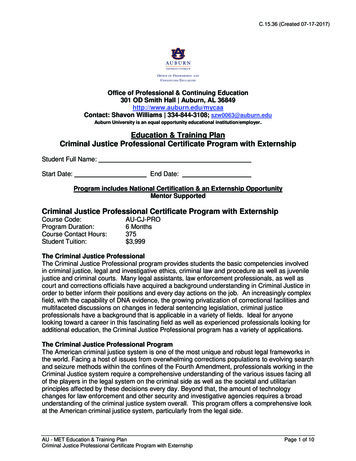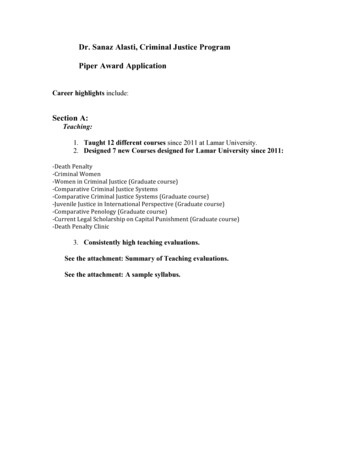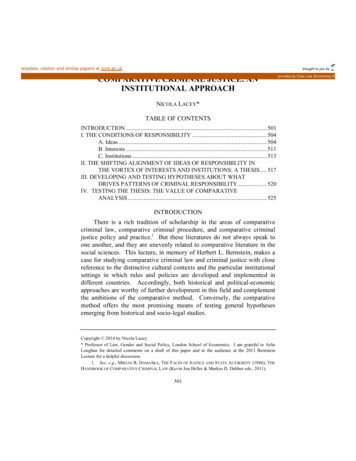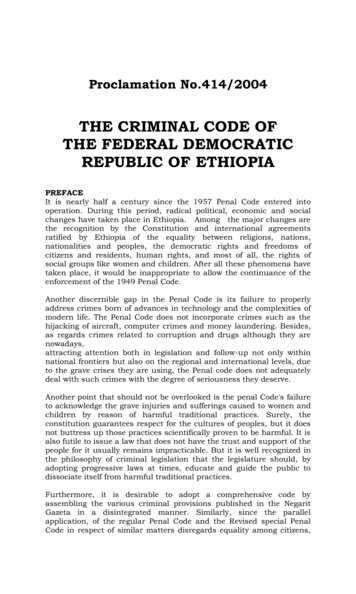
Transcription
Proclamation No.414/2004THE CRIMINAL CODE OFTHE FEDERAL DEMOCRATICREPUBLIC OF ETHIOPIAPREFACEIt is nearly half a century since the 1957 Penal Code entered intooperation. During this period, radical political, economic and socialchanges have taken place in Ethiopia. Among the major changes arethe recognition by the Constitution and international agreementsratified by Ethiopia of the equality between religions, nations,nationalities and peoples, the democratic rights and freedoms ofcitizens and residents, human rights, and most of all, the rights ofsocial groups like women and children. After all these phenomena havetaken place, it would be inappropriate to allow the continuance of theenforcement of the 1949 Penal Code.Another discernible gap in the Penal Code is its failure to properlyaddress crimes born of advances in technology and the complexities ofmodern life. The Penal Code does not incorporate crimes such as thehijacking of aircraft, computer crimes and money laundering. Besides,as regards crimes related to corruption and drugs although they arenowadays,attracting attention both in legislation and follow-up not only withinnational frontiers but also on the regional and international levels, dueto the grave crises they are using, the Penal code does not adequatelydeal with such crimes with the degree of seriousness they deserve.Another point that should not be overlooked is the penal Code's failureto acknowledge the grave injuries and sufferings caused to women andchildren by reason of harmful traditional practices. Surely, theconstitution guarantees respect for the cultures of peoples, but it doesnot buttress up those practices scientifically proven to be harmful. It isalso futile to issue a law that does not have the trust and support of thepeople for it usually remains impracticable. But it is well recognized inthe philosophy of criminal legislation that the legislature should, byadopting progressive laws at times, educate and guide the public todissociate itself from harmful traditional practices.Furthermore, it is desirable to adopt a comprehensive code byassembling the various criminal provisions published in the NegaritGazeta in a disintegrated manner. Similarly, since the parallelapplication, of the regular Penal Code and the Revised special PenalCode in respect of similar matters disregards equality among citizens,
the existence of a comprehensive Criminal Code will put an end to suchpractice.In order to eliminate the above-mentioned shortcomings and adopt acomprehensive Criminal code, substantial activities have beenundertaken throughout the entire Country. Discussions have been heldon the draft Criminal Code prepared by the Ministry of Justice and theJustice and Legal System Research Institute. Legal and medicalprofessionals, psychiatrists, different institutions of higher educationand professional associations have made significant contributionsthrough the opinions they gave to the enactment of the law.Representatives of the people selected from different sectors andassociations have forwarded important views in discussion forums onthe draft laws conducted in Addis Ababa and the regions. It is mainlyon the basis of public opinion that punishments have increased inrespect of crimes like rape and aggravated theft. Moreover, the opinionsof legal scholars and the laws and experiences of foreign countries havebeen consulted to enrich the content of the Criminal Code.Finally, one point that must not be left unmentioned is the matterconcerning the determination of sentence. Since it is essential tofacilitate the method by which Courts can pass similar punishments onsimilar cases, some major changes have been made in the provisions oftheCode.Provisions of the Penal Code that used to make sentencing complicatedand difficult have been amended. Provisions have been inserted whichenable the Courts to pass the appropriate penalty for each case bycarefully examining from the lightest to the most severe punishment. Asentencing manual will also be issued to ensure and control thecorrectness and uniformity of sentencing.Another point which must be raised in connection with thedetermination of sentence is that the purpose of Criminal Law is topreserve the peace and security of society. It protects society bypreventing the commission of crimes, and a major means of preventingthe commission of crime is punishment.Punishment can deter wrongdoers from committing other crimes; it canalso serve as a warning to prospective wrongdoers. Althoughimprisonment and death are enforced in respect of certain crimes themain objective is temporarily or permanently to prevent wrongdoersfrom committing further crimes against society. And in such cases withthe exception of the death sentence even criminals sentenced to lifeimprisonment can be released on parole before serving the whole term;in certain crimes convicts can be released on probation without thepronouncement of sentence or without the enforcement of the sentencepronounced. This helps wrongdoers to lead a peaceful life and itindicates the major place, which the Criminal Law has allocated fortheir rehabilitation.The fact that wrongdoers, instead of being made to suffer while inprison, take vocational training and participate in academic education,which would benefit them upon their release, reaffirms the great
concernenvisaged by the Criminal Code about the reform of criminals.It must be noted that, by laying down in the Code express provisionsconcerning these cases, it is intended that Courts should, on passingsentence, take into account the purpose of the law and the differentaims of punishment.It is hoped that this Criminal Code, which has been revised through allthese persistent efforts, will ensure respect for the order, peace andsecurity of the State and its peoples as well as respect for the rightsand freedoms of its citizens and inhabitants.Being convinced that this Code will enable to accelerate the economicprogress of the State, that it will strengthen a steady order of freemarket and that it will, above all, contribute towards the promotion of afair judicial system, in our country, pursuant to Article 55 (1) of theConstitution of the Federal Democratic Republic of Ethiopia it is herebyproclaimed as follows:1. Short Title:This Proclamation may be cited as "The Criminal Code of theFederal Democratic Republic of Ethiopia 2004."2. Repeal:The following proclamations:a) the Penal Code of the Empire of Ethiopia 1957,andb) the Revised Special Penal Code of the Provisional Military.Administration Council 1982, Proclamation No. 214/1982, arehereby repealed as from the 9th of May, 2005.3. Special Case:As provided in Article 3 of this Code, nothing shall affect theapplication of special laws and regulations.4. Effective Date:This Criminal Code as published in a separate volume of theFederal Negarit Gazeta under Proclamation No. 414/2004, shallcomeinto force as of the 9th of May 2005.Done at Addis Ababa, this 9th day of May 2005Girma Wolde GiorgisPresident of the Federal Democratic Republicof EthiopiaPART IGENERAL PARTBOOK ICRIMES AND CRIMINALSTITLE ICRIMINAL LAW AND ITS SCOPECHAPTER ISCOPE OF THE LAW
Article 1.- Object and Purpose.The purpose of the Criminal Code of the Federal DemocraticRepublic of Ethiopia is to ensure order, peace and the security ofthe State, its peoples, and inhabitants for the public good.It aims at the prevention of crimes by giving due notice of thecrimes and penalties prescribed by law and should this beineffective by providing for the punishment of criminals in orderto deter them from committing another crime and make them alesson to others, or by providing for their reform and measures toprevent the commission of further crimes.Article 2.-Principle of Legality.(1) Criminal law specifies the various crimes, and the penalties andmeasures applicable to criminals.(2) The Court may not treat as a crime and punish any act oromission which is not prohibited by law. The Court may notimpose penalties or measures other than those prescribed bylaw.(3) The Court may not create crimes by analogy,(4) The above provisions shall not prevent the Court frominterpreting the law. In cases of doubt the Court shall interpretthe law according to its spirit, in accordance with the meaningintended by the legislature so as to achieve the purpose it has inview.(5) Nobody shall be tried or punished again for the same crime forwhich he has been already convicted, punished or subjected toother measures or acquitted by a final decision in accordancewith the law.Article 3.- Other Penal Legislation.Nothing in this Code shall affect regulations and special laws of acriminal nature:Provided that the general principles embodied in this Code areapplicable to those regulations and laws except as otherwiseexpressly provided therein.Article 4.- Equality Before the Law.Criminal law applies to all alike without discrimination asregards persons, social conditions, race, nation, nationality,social origin, colour, sex, language, religion, political or otheropinion, property, birth or other status.No difference in treatment of criminals may be made except asprovided by this Code, which are derived from immunitiessanctioned by public international and constitutional law, orrelate to the gravity of the crime or the degree of guilt, the age,circumstances or special personal characteristics of the criminal,and the social danger which he represents.
CHAPTER IISCOPE OF APPLICATION OF THE LAWSection I:-Conditions as to TimeArticle 5.- Non-retrospective Effect of Criminal Law.(1) If an act, declared to be a crime both under the repealedlegislation and this Code was committed prior to the coming intoforce of this Code, it shall be tried in accordance with therepealed law.(2) An act declared to be a crime under this Code but not under therepealed law and committed prior to the coming into force of thisCode is not punishable.(3) No act shall be tried or punished where it was a crime committedunder the repealed legislation but is not declared so to be underthis Code. If proceedings have been instituted they shall bediscontinued.Article 6.-Exception: Application of the More Favourable Law.Where the criminal is tried for an earlier crime after the cominginto force of this Code, its provisions shall apply if they are morefavourable to him than those in force at the time of thecommission of the crime.The Court shall decide in each case whether, having regard to allthe relevant provisions, the new law is in fact more favourable.Article 7.-Application as to Measures.Upon the coming into force of this Code measures prescribed inthis Code (Arts. 129-165) shall apply when passing sentence oncrimes committed under the repealed law.Article 8.-Application as to Periods of Limitation.(1) Upon the coming into force of this Code, periods of limitationapplicable to the right to prosecute and to enforce a penalty inrespect of crimes committed under repealed legislation shall begoverned by this Code.However, the time which elapsed prior to the coming into forceof this Code shall be taken into account.(2) Wherever the provisions of this Code require official proceedingsto be instituted in respect of crimes committed under repealedlegislation and which under such legislation could beprosecuted upon private complaint, such right of complaint
shall be barred if not exercised within a period of two years afterthe coming into force of this Code.Article 9.-Enforcement of Judgments passed under RepealedLegislation.Where a sentence has been passed in accordance with the repealedlegislation its enforcement shall be governed by the following principles:(1) If the Code no longer restrains the act in respect of which thesentence was passed the punishment shall no longer beenforceable or shall forthwith cease to have effect.(2) Where a sentence has been passed for the breach of a criminallaw enacting a prohibition or an obligation limited to a givenperiod of time for special reasons of a transitory nature, theexpiration of the said period shall not bar the enforcement of thepunishment,norshall the prosecution be barred by such expiration.(3) Punishments awarded before or after the coming into force ofthis Code shall be enforced as provided in this Code. This shallalso apply to the recovery of fines, the suspension of sentenceand conditional release.(4) If a prisoner who is undergoing punishment at the time of thecoming into force of this Code is found guilty of an earlier crimewhich remained unknown and was punishable by a penaltyentailing loss of liberty the Court shall pass an aggregatesentence in accordance with the provisions relating toconcurrent, crimes (Art. 186) and shall take into account theprovisions regarding the application of the more favourable law(Art. 6).The period of imprisonment undergone in pursuance of theearlier judgment snail be deducted.Article 10.ApplicationReinstatement.astoCancellationandThe cancellation of entries in the judgment register as well asreinstatement in the case of judgments given under repealedlegislation shall be governed by this Code.Section II.-Conditions as to PlaceSub-section I.Article 11.Case.Principal ApplicationCrimes Committed on Ethiopian Territory: Normal(1) This Code shall apply to any person whether a national or aforeigner who has committed one of the crimes specified in thisCode on the territory of Ethiopia.The national territory comprises the land, air and bodies ofwater, the extent of which is determined by the Constitution.
(2) Nothing in the provision of sub-article (1) of this Article shallaffect immunities of persons enjoying an official status assanctioned by public international law.(3) If the criminal has taken refuge in a foreign country, hisextradition shall be requested so that he may be tried underEthiopian Law.Article 12.-Special Case: Delegation.(1) Where a foreigner who has committed a crime in Ethiopia cannotbe tried or punished, because he has taken refuge in a foreigncountry and his extradition cannot be obtained, the Ethiopianauthorities may request that he be tried in the country of refuge.(2) The accused foreigner cannot be retried in Ethiopia for the samecrime if he has been tried and acquitted in the foreign country bya judgment which has become final or if he has been grantedpardon or amnesty or if the prosecution or sentence has beenbarred by limitation.(3) Where the criminal has not undergone his punishment or onlyundergone part of it in the foreign country, the whole or theunexpired part thereof shall be enforced in Ethiopia, if he isapprehended and the enforcement of the penalty is not barred bylimitation under the provisions of this Code.Should the punishments differ as to their nature or form, suchpunishment as is the closest to that imposed in the foreigncountry shall be enforced.Article 13.-Crimes Committed against Ethiopia OutsideIts Territory.This Code shall apply to any person who outside Ethiopia hascommitted one of the crimes against the State of Ethiopia, itssafety or integrity, its institutions, essential interests or currencyas defined in Book III, Title I, Chapter I, and under Title V of thisBook (Art. 238 -260 and Art. 355-374).Article 14.- Crimes Committed In a Foreign Country by anEthiopian Enjoying Immunity.(1) Subject to the provision of Article 13, this Code shall apply to amember of the Ethiopian diplomatic or consular service, anEthiopian official or agent who cannot be prosecuted at theplace of commission of the crime by virtue of internationalprinciples of immunity, where he committed in a foreign countrya crime punishable both under the Ethiopian Code and underthe law of the country where it was committed.(2) Where, according to either the foreign law or this Code, thecrime is punishable upon a formal complaint no proceedingsmay be instituted where such complaint has not been lodged.Article 15.-Crimes Committed in a .Foreign Country by aMember of the Defence Forces.
(1) Where a member of the Ethiopian Defence Forces in suchcapacity commits a crime against the ordinary law In a foreigncountry he shall be subject to the ordinary law and territorialjurisdiction if he is arrested and tried in the country where thecrime was committed.If he has taken refuge in Ethiopia, he shall be tried inaccordance with the provision of Article 21 (2) of this Code.(2) In cases of crimes against international law and specificallymilitary crimes as defined in Article 269-322, the member of theDefence Forces shall remain subject to national law, and be triedundertheprovisions of this Code by Ethiopian military courts.Article 16.-Effect of Foreign Sentences.(1) Where a -criminal who is subject to Ethiopia's principaljurisdiction (Arts. 11,13,14 (1) and 15 (2)) haS been sentenced ina foreign country, he may be tried and sentenced again on thesame charge in Ethiopia, H he is found in Ethiopia or wasextradited to it.(2) His discharge or acquittal in a foreign country shall be no bar toa fresh trial or sentence being passed in Ethiopia in accordancewith this Code.(3) Where by reason of the crime committed, the criminal hasalready been convicted In a foreign country and has undergonethe whole or part of the punishment, the Court shall deduct thepunishment already undergone from the new sentence to bepassed.Sub-section II.ArticleSubsidiary national Law or Universal Order.Against(1) Any person who has committed outside Ethiopia:(a) a crime against international law or an international crimespecified in Ethiopian legislation, or an international treaty or aconvention to which Ethiopia has adhered; or(b) a crime against public health or, morals specified in Articles525, 599, 635, 636, 640 or 641 of this Code;shall be liable to trial, in Ethiopia in accordance with theprovisions of this Code and subject to the general conditionsmentioned hereinafter (Arts. 19 and 20(2)) unless a finaljudgment has been given after being prosecuted in the foreigncountry.(2) Nothing in this Article shall affect the provisions of Articles 14and 15(2).Article 18.-Other Crimes Committed Outside Ethiopia .
(1) This Code shall also apply to any person who has committed acrime outside Ethiopia against an Ethiopian national or to anyEthiopian national who has committed outside Ethiopia a crime.ofanotherkind than those specified in the foregoing Articles, if the criminalwas not tried in the foreign country for the crime, provided that:(a) the act to be tried is prohibited by the law of the State whereit was committed and by Ethiopian law; and(b) it is of sufficient gravity under the latter law to justifyextradition.(2) In the case of all other crimes committed outside Ethiopia by aforeign national, the criminal shall, save as otherwise expresslyprovided, failing extradition, be prosecuted and tried only if thecrime is punishable under Ethiopian law with death or withrigorous imprisonment for not less than ten years.Article 19.-Conditions for Subsidiary Application.(1) This Code shall apply where:(a) the complaint by the victim or his dependants was lodged when itis a condition for prosecution under the law of the place ofcommission of the crime or under Ethiopian law,(b) the criminal is within the territory of Ethiopia and has not beenextradited, or extradition to Ethiopia was obtained by reason of thecrime committed; and(c) the crime was not legally pardoned in the country of commissionand that prosecution is not barred either under the taw of thecountrywhere the crime was committed or under Ethiopian law.(2) The condition specified under sub-article 1 (a) and (c) of thisArticle need not necessarily be satisfied as regards the lands ofcrimes prowled for under Article 17 and 18(2) of this code.(3) The prosecution shall consult with the Minister of Justice beforeinstituting proceedings.(4) In case of disparity between the punishments prescribed underthis Code and the law of the country of commission, thepunishment to be imposed shall be the one, which is morefavourable to the accused.Article 20.-Effect of Foreign Sentences.(1) In all cases where Ethiopian courts have a subsidiaryjurisdiction only (Arts.15(1), 17 and 18), the criminal cannot betried and sentenced in Ethiopia if he was regularly acquitted ordischarged for the same act in a foreign country.(2) If the criminal was tried and sentenced in a foreign country butdid not undergo his punishment, or served only part of it in thesaid country, the punishment, or the remaining part thereof,maybeenforced according to the forms prescribed by this Code, if it is
not barred by limitation under this Code or the law of Wecountry of commission. The provisions of Article 12 (3) shallapplymutatismutandis to this Article.Sub-section III.- General ProvisionsArticle 21.- Extradition.(1) Any foreigner who commits an ordinary crime outside theterritory of Ethiopia and who takes refuge in Ethiopia may beextradited in accordance with the provisions of the law, treatiesorinternationalcustom; extradition shall be granted on the application made inproper form by the State where the crime was committed for thepurpose of trial under the territorial law when the crime does notdirectly and principally concern the Ethiopian State (Art. 13).(2) No Ethiopian national having that status at the time of thecommission of the crime or at the time of the request for hisextradition may be handed over to a foreign country. However,he shall be tried by Ethiopian courts under Ethiopian law.(3) In all cases where a crime raises a question of extradition therequest shall be dealt with In accordance with Ethiopian Lawand existing treaties.Article 22.-Recognition of Foreign Sentences.(1) Foreign criminal sentences may be taken into account asregards antecedents and aggravating circumstances, thegranting or revocation of an order for conditional release,recidivism and its punishment, the enforcement of safetymeasures, incapacities and forfeitures, conditions as toreinstatement, as well as compensation, restoration of propertyand other civil effects and all other legal consequences providedby this Code.(2) The foreign sentence shaft not be recognized unless passed byan ordinary Court and not by a special tribunal for a crimepunishable under this Code and its validity has been recognizedby the appropriate Ethiopian authority.Such recognition may be made on the basis of a certified extractfrom the judgment register of the criminal or of the judgmentpronounced or by means of an official attestation delivered by thejudicial or executive foreign authority, or in any other reliablemanner.TITLE IITHE CRIME AND ITS COMMISSIONCHAPTER ITHE CRIMEArticle 23.- Crimes.
(1) A crime is an act, which is prohibited and made punishable bylaw.In this Code, an act consists of the commission of what isprohibited or the omission of what is prescribed by law.(2) A crime is only completed when all its legal, material and moralingredients are present.(3) Notwithstanding the provision of sub-article (2) of this Article, ajuridical person shall be criminally liable to punishment underthe conditions laid down in Article 34 of this Code.(4) A crime is punishable where the Court has found the crimeproved and deserving of punishment.Article 24.-Relationship of Cause and Effect.(1) In all cases where the commission of a crime requires theachievement of a given result, the crime shall not be deemed tohave been committed unless the result achieved is theconsequence of the act or omission with which the accusedperson is charged.This relationship of cause and effect shall be presumed to existwhen the act within the provisions of the law would, in thenormal course of things, produce the result charged.(2) Where there are preceding, concurrent or intervening causes,whether due to the act of a third party or to a natural orfortuitous event, which are extraneous to the act of the accused,this relationship of cause and effect shall cease to exist when theextraneous cause in itself produced the result.If, in such a case, the act with which the accused person ischarged in itself constitutes a crime he shall be liable to thepunishment specified for such a crime.(3) Relationship of cause and effect shall be presumed to existbetween each cause specified under sub-article (2) above and theresult achieved, when the result is the cumulative effect of thesecauses, even though each cause cannot independently producethe result.Article 25.- Place and Time of the Crime.(1) A crime is committed at the place where and at the time whenthe criminal performed or failed to perform the act penalized bycriminal law.An attempt is committed at the place where and at the time whenthe criminal performed or failed to perform the preliminary acts:which constitute such an attempt.(2) With regard to non-instantaneous crimes where the act and thecriminal result do not coincide the crime is deemed to have beencommitted both at the place of the unlawful act and that of itsresult.
Similarly, an attempt is deemed to have been committed both atthe place where the criminal attempted the crime and the placehe intended the result to be produced.For purposes of prosecution, the jurisdiction of the place wherethe result was achieved is subsidiary to that of the place ofcommission.(3) When a combination or repetition of criminal acts is an elementof an ordinary or aggravated crime as provided under Article 61,or when the act is pursued over a period of time, the place whereand the time when the crime is committed shall be the placewhere and the time when one of the combined or repeated actsor part of the acts pursued is committed.CNAPTER IIDEGREES IN THE COMMISSION OF THE CRIMEArticle 26.-Preparatory Acts.Acts which are committed to prepare or make possible a crime,particularly by procuring the means or creating the conditionsfor its commission are not usually punishable, however, suchactsacepunishable where:(a) in themselves they constitute a crime defined by law; or(b) they expressly constitute a special prime by law owing to theirgravity or the general danger they entail,Article 27.-Attempt,(1) Whoever intentionally begins to commit a crime and does notpursue or is unable to pursue his criminal activity to its end, orwho pursues his criminal activity to its end without achieving theresult necessary for the completion of the crime shad be guilty ofan attempt.The crime is deemed to be begun when the act performed dearlyaims, by way of direct consequence, at Ms commission.(2) An attempted crime is always punishable save as is otherwiseprovided by law,A mere attempt to instigate or assist in a crime does not comewithin the provisions of the law unless it is expressly provided tothe contrary.(3) Without prejudice to the provisions of Article 117, in the case ofan attempted crime the criminal is liable to the punishmentattaching to the crime he intended to commit:Provided that if circumstances so Justify the Court may reducethe punishment within the limits provided by law (Art. 179).
Article 28.- Renunciation and Active Repentance.(1) If a criminal of his own free will renounces the pursuit of hiscriminal activity the Court shall reduce the punishment withinthe limits provided by law (Art. 179) or without restriction (Art.180)ifcircumstancesso justify. No punishment shall be imposed if the renunciationwas prompted by reasons of honesty or high motives.(2) If a criminal, having completed his criminal activity, of his ownfree will prevents, or contributes to prevent the consequentresult, the Court shall without restriction reduce the punishment(Art. 180).(3) This Article shall also apply to an instigator or an accomplice(Arts. 36 and 37) who of his own free will renounced the pursuitof his criminal activity or has done everything incumbent uponhim to prevent the commission of the crime:Article 29.- Crime Impossible of Completion.When a criminal has attempted to commit a crime by means oragainst an object of such nature that the commission of thecrime was absolutely impossible, the Court shall, withoutrestriction, reduce the punishment (Art. 180).No punishment shall be imposed when the criminal, fromsuperstition or owing to the simplicity of his mind acted by usingmeans or processes, which could in no case have a harmfuleffect.The above provisions of this Article shall similarly apply to aninstigator or an accomplice.Article 30.-Special Case of Attempt.When the acts done in an attempt to commit a crime inthemselves constitute a separate crime the punishment attachingthereto shall be applied.Article 31.-Discretionary Power of the Court.In determining the punishment to be imposed or, whereappropriate, in reducing it within the limits allowed by law, or, inspecial cases, in imposing no punishment where an attempt wasabandoned or failed, the Court shall take into account allrelevant circumstances. It shall in particular, take intoconsideration the stage reached in the carrying out of theattempt and the danger it represented, the reasons for which itfailed, the motives which prompted the renunciation or the activerepentance of the criminal, as well as his antecedents and thedanger he represents to society.CHAPTER IIIPARTICIPATION IN THE COMMISSION OF A CRIME
Article 32.- Principal Criminal.(1) Any person shall be regarded as having committed a crime as aprincipal criminal and punished as such if:(a) he actually commits the crime either directly or indirectly, inparticular by means of an animal or a natural force; or(b) he without performing the criminal act itself fully associateshimself with the commission of the crime and the intendedresult; or(c) he employs an infant or a person who is mentally deficientor unaware of the circumstances, for the commission of a crimeorcompels another person to commit a crime.(2) Where the crime committed goes beyond the intention of thecriminal he shall be tried in accordance with Article 58(3).(3) Where two or more persons are in
the existence of a comprehensive Criminal Code will put an end to such practice. In order to eliminate the above-mentioned shortcomings and adopt a comprehensive Criminal code, substantial activities have been undertaken throughout the entire Country. Discussions have been held on the draft Criminal Code prepared by the Ministry of Justice and the


